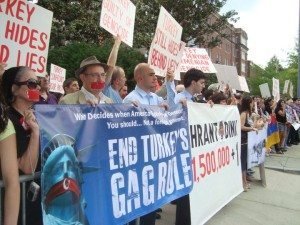As Armenians, we know the significance of the Armenian Genocide and how it still affects us 98 years later. Most of us are taught from day one that we must never forget what happened, never forget the lives lost, never forget to fight for justice. In some ways, it can seem we are too one-track minded; non-Armenians (and even some Armenians) think all we focus on is genocide recognition.

I agree that we do focus much of our time and energy on recognition (and for good reason), but I don’t think that it is the only issue near and dear to our hearts. Armenians (and the ANCA) focus on so much more: Artsakh, aid to Armenia, Armenian history in schools, combating propaganda from Turkey and Azerbaijan, to name a few. We work on preserving our culture by passing on recipes, dances, songs. We tell stories, we laugh, we embrace our family time. All of these things, no matter how much time we spend on them, are necessary for Armenians to survive. They’re necessary for any ethnicity to survive.
But, we must not overlook our milestones and victories along the way. And with April 24 approaching and genocide recognition one of our top priorities this month and always, I want to talk about how our milestones show how far we’ve come.
It’s been nearly 100 years since the genocide began, and in the years since we’ve accomplished more than we remember. Not just the ANCA, but all of us as Armenians. Milestones like the 50th anniversary of the genocide in 1965, when we made a worldwide call for justice to recognize the tragedy. That was nearly 50 years ago and yet only 42 states in this country formally recognize it, although we’re working hard to get those remaining 8 to do the same.
The 70th anniversary in 1985 saw a tremendous march in Washington, D.C. Each year in the nation’s capital, the Greater Washington community (and the ANCA Eastern Region) turns out to protest the White House or Turkish Embassy and to honor the genocide victims with solemn vigils at the Armenian Embassy. We commemorate the atrocity with Members of Congress and other friends to the Armenian cause with a reception on Capitol Hill on the evening of April 24.
Every year, there are large commemorations at Armenian Genocide memorials in Los Angeles and in Times Square in New York City. We use our large cities and venues to get our message across in a big way, but we must not forget the vital work we’re doing in our smaller communities, as well.
It goes beyond milestone events; we have seen legislation introduced (and passed) at the state and federal levels thanks to the dedication of people like you. It doesn’t take much–a new lecture here, a letter-writing campaign there–but it all matters.
Communities as tiny as Granite City and Racine can pack as much punch as our larger communities like New Jersey or Boston. I’d encourage you to attend an Armenian Genocide commemoration event in a place you’ve never visited before. It’s a great way to gauge the pulse of a community and an even better way to make new friends.
Each of these events, like the Philadelphia Armenian Genocide Walk for Justice, is a milestone. The local town councils that have passed genocide legislation—they are part of our story, too. An event at a city hall in Florida: milestone. A genocide survivor in Massachusetts celebrating her 104th birthday this year: milestone.
The bottom line is that the Armenian Genocide—the 20th century’s first and most overlooked genocide—and its commemoration and condemnation, is woven into the fabric of American civic life. It is not just something Armenians remember and fight for. It is a key period of American history that needs to be correctly identified by the U.S. government, by countries all over the world, and especially by Turkey and its government.
So, why do we continue to pursue justice? Because not doing so is denying our ancestors and future generations the truth. We may know what happened, but that is not enough. Our milestones are great to look back on, but we can only look back for so long before we need to turn our heads forward. Today is what we need to work on if we want to see the victories.
Today will be considered a milestone 20, 50, and 100 years from now.


Be the first to comment